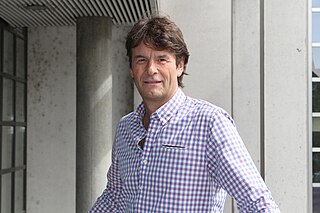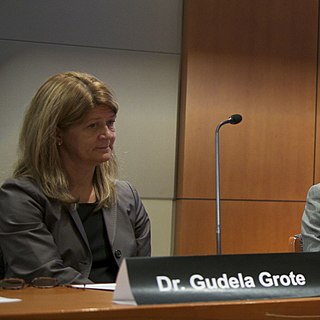Related Research Articles

Richard Robert Ernst was a Swiss physical chemist and Nobel laureate.

ETH Zurich is a public research university in Zurich, Switzerland. Founded in 1854 with the stated mission to educate engineers and scientists, the university focuses primarily on science, technology, engineering, and mathematics.

The University of Zurich is a public research university located in the city of Zurich, Switzerland. It is the largest university in Switzerland, with its 28,000 enrolled students. It was founded in 1833 from the existing colleges of theology, law, medicine which go back to 1525, and a new faculty of philosophy.

Paul Hermann Scherrer was a Swiss physicist. Born in St. Gallen, Switzerland, he studied at Göttingen, Germany, before becoming a lecturer there. Later, Scherrer became head of the Department of Physics at ETH Zurich.

Theo Wallimann is a Swiss biologist who was research group leader and Adjunct-Professor at the Institute of Cell Biology ETH Zurich and later at the Institute of Molecular Health Science https://mhs.biol.ethz.ch/about-us/emeriti-formermembers/wallimann.html at the ETH Zurich at the Biology Department https://biol.ethz.ch/en/, of the ETH Zurich, Switzerland.
WORLD.MINDS is a non-profit foundation set up in June 2008 by Rolf Dobelli, with the goal of creating "a bridge between the science, business and cultural communities".
The Swiss Finance Institute (SFI) is a national center for research, doctoral training, knowledge exchange, and continuing education in the fields of banking and finance. Created in 2006 as a public–private partnership, SFI is a common initiative of the Swiss finance industry, leading Swiss universities, and the Swiss Confederation.

Erich Nigg is a Swiss cell biologist.

Markus Affolter is a Swiss Developmental Biologist and Professor at the Biozentrum University of Basel, Switzerland.

Andreas Plückthun is a scientist whose research is focused on the field of protein engineering. Andreas Plückthun is the director of the department of biochemistry at the University of Zurich. Plückthun was appointed to the faculty of the University of Zurich as a Full professor of biochemistry in 1993. Plückthun was group leader at the Max Planck Institute of Biochemistry, Germany (1985-1993). He was elected to the European Molecular Biology Organization (EMBO) in 1992, and named a member of the German National Academy of Science (Leopoldina) in 2003. He is cofounder of the biotechnology companies Morphosys Molecular Partners AG and G7 Therapeutics..
Viola Vogel, also known as Viola Vogel-Scheidemann, is a German biophysicist and bioengineer. She is a professor at ETH Zürich, where she is head of the Department of Health Sciences and Technology and leads the Applied Mechanobiology Laboratory.

Pablo Sinues is an associate professor at the Department of Biomedical Engineering at the University of Basel and lecturer at the Department of Chemistry and Applied Biosciences at ETH Zürich. He received his Ph.D. in Mechanical Engineering from the Charles III University of Madrid (Spain) and Habilitation in Analytical Chemistry at ETH Zürich. Sinues heads the Translational Breath Research group located at the University Children’s Hospital Basel

Felicitas Pauss is an Austrian physicist. She was elected Professor for Experimental Particle physics at ETH Zurich, Switzerland, in 1993. Her research activities concentrated on two main research fields: particle physics at the high-energy frontier and astroparticle physics, addressing fundamental open questions about the structure of the Universe and the underlying mechanisms that govern its evolution.

Gudela Grote is a German psychologist and academic. She was educated in Germany and the United States, and established her career in Switzerland.
Madhavi Krishnan is a British chemist who is Professor of Physical Chemistry at the University of Oxford. Krishnan invented an electrostatic fluidic trap which permits the spatial control and manipulation of nanoscale materials. These traps can permit the sensitive detection of biomarkers of disease, allowing for early diagnosis.

Sabine Werner is a German biochemist and professor.

Collin Yvès Ewald is a Swiss scientist investigating the molecular mechanisms of healthy aging. He is a molecular biologist and a professor at ETH Zurich, where he leads the Laboratory of Extracellular Matrix Regeneration. His research focuses on the remodeling of the extracellular matrix during aging and upon longevity interventions.
Hans-Beat Bürgi is a Swiss chemist and crystallographer. He was a professor for crystallography at the University of Bern from 1979 to 2007.

Paola Picotti is an Italian biochemist who is Professor for Molecular Systems Biology at ETH Zürich. She is Deputy Head of the Institute for Molecular Systems Biology. Her research investigates how the conformational changes of proteins impact molecular networks with cells. She received numerous awarded awards, among which the 2019 EMBO Gold Medal.

Barbara Schmid-Federer is a Swiss politician, educator, and philanthropist. A member of the Christian Democratic People's Party of Switzerland, she was elected to a seat in the National Council in 2007, serving until 2018. As a member of the National Council, Schmid-Federer spearheaded family policy and children's safety initiatives, including public breastfeeding and cyberbullying prevention in her platforms. She was appointed as president of Pro Juventute in 2019 and served in that capacity until 2022, when she assumed the role of Vice President. She served as President of the Swiss Red Cross between 2022 and 2023.
References
- 1 2 3 "Curriculum Vitae Prof. Dr. Michael O. Hengartner" (PDF). Nationale Akademie der Wissenschaften Leopoldina. Retrieved 23 November 2017.
- ↑ "Michael Hengartner appointed new president of the ETH Board". Swiss Federal Council. GS-EAER Communications.
- ↑ "Biography 38: Michael Otmar Hengartner (966 - )". Cold Spring Harbor Laboratory. Retrieved 4 December 2020.
- 1 2 "Election of Prof. Michael Hengartner as a New Member of the Board". NAGRA Kudelski Group. 25 March 2020. Retrieved 9 December 2020.
- ↑ Walter Bernet (2 February 2014). "Wir müssen Bologna bildungskompatibler machen". Neue Zürcher Zeitung. Retrieved 23 November 2017.
- 1 2 Mario Stäuble (25 June 2013). "Hi, I'm Michael". Tages Anzeiger. Retrieved 23 November 2017.
- ↑ "UZH - UZH News - Michael Hengartner Resigns as President of UZH" . Retrieved 2020-03-11.
- ↑ "Michael O. Hengartner". Nationale Akademie der Wissenschaften Leopoldina. Retrieved 23 November 2017.
- ↑ Walter Bieri (4 September 2019). "Uni-Rektor Hengartner wird ETH-Ratspräsident". bluewin.ch. Retrieved 25 October 2022.
- ↑ René Donzé (15 August 2020). "Michael Hengartner: «Der Schweiz fehlt oft der Mut, gross zu denken»". magazin.nzz.ch. Retrieved 16 March 2023.
- ↑ "Horizon Europe: Swiss universities fear brain drain". swissinfo.ch. 15 November 2021. Retrieved 16 March 2023.
- ↑ Reza Rafi, Simon Marti (23 January 2022). "Wir erleben die ersten Rückschläge". blick.ch. Retrieved 30 March 2023.
- ↑ "Swiss universities warn of 'serious consequences' of Horizon Europe exclusion". swissinfo.ch. 23 January 2022. Retrieved 30 March 2023.
- ↑ Manuela Siegert (25 January 2022). "Wie Schweizer Spitzenforscher ausgebremst werden". srf.ch. Retrieved 30 March 2023.
- ↑ Helene Obrist (5 February 2022). "Wenn Emotionen auf geschliffene Politiker-Sätze prallen – das war die Tierversuch-«Arena»". Watson . Retrieved 4 April 2023.
- ↑ "Swiss researchers fear isolation". swissinfo.ch. 30 October 2022. Retrieved 4 April 2023.
- ↑ "Kudelski S.A." wsj.com. Retrieved 25 October 2022.
- ↑ "Ehrendoktorat Grosse Ehre aus Paris". UZH News. 17 October 2016. Retrieved 10 December 2020.